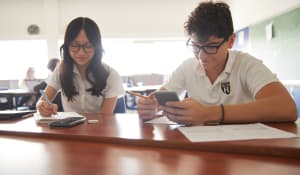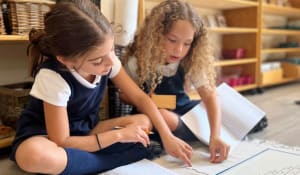However, today's students find print to be a clumsy way to access information. Print is no longer the easiest way to convey information in an expanding world of readily accessible digital audio and video resources.
Both sides of this debate forget that the best audio and video works are based on the written word. It's easy to demonstrate this to students: Ask them if actors make up the plot and dialogue of a movie as it is being filmed. They know there is always a script. Then ask about the origins of the script. The answer is simple: It's written.
The key to teaching new literacy skills is to change the focus of student writing. The written essay developed because it was easy for most people to create using the available pen-and-ink and typewriter technologies. Until this century, audio and video could be created only by the few with access to complex technology.
But the value of a written essay lies not in its format but in the skills students develop: identify a thesis, research and analyze evidence to test the thesis, and then present the analysis results.
Why must these skills be confined to a written format? Use new media to teach students to develop these skills and present their findings in formats that they are familiar with–and that they will use in their working lives.
Podcasts are simpler and less time-consuming to create than movies. A podcast is essentially a recorded radio broadcast, such as a BBC, CBC or NPR documentary. Students can also produce enhanced podcasts that include images, which can be used very effectively to strengthen the podcast for a primarily visual culture.
Creating Podcasts
Podcasts require only the tools that many intermediate and senior students already carry with them–a laptop with its built-in camera and software.
Both Apple and PC computers come preloaded with everything that students will need: software to record, edit and publish podcasts, and a built-in camera.
Either platform can be used. Students at my school use both. However, my students have shown a marked preference for using Apple equipment. Apple's GarageBand is more intuitive to learn and easier to use than Windows Live Movie Maker, but my students have done good work in both.
Podcast Pedagogy
Teaching podcasting is all about teaching writing–students don't need to know a lot about using the software.
The heart of any podcast is the script. Before students start to record a podcast, they must have finished a script that the teacher has approved to ensure that it contains the elements essential in good academic writing.
Students should learn how to write a podcast script in the same way they learned to write essays, using the "hamburger paragraph" approach. A well-written academic podcast script must contain the same elements as a well-written essay: a thesis, proof, conclusion, a bibliography of resources used in researching the script, and footnotes.
The script makes podcasts different:
- A script must be broken down into sections–a thesis or introduction, the main body where the thesis will be proven, and a conclusion.
- A script must show the dialogue to be spoken by the student, or the sound clip to be played, as well as the image associated with the dialogue or sound clip.
- A script must have a bibliography of all images and sound clips included in the podcast itself.
After the script has been evaluated and approved by the teacher, it may be recorded. A page of script usually equates to about 45 seconds of a podcast. The script should form a substantial part of the mark for the assignment–from a third to one half of the total mark.
Once completed, each students podcast should be played for the class. This will give students a chance to participate in the evaluation of the podcast.
Classroom Tips
Start by teaching students about the script and its format.
Introduce the software. Don't think that you have to be an expert at using the software. Show students how to do five tasks:
- Record
- Add a sound effect, music or speech clip to the recording
- Adjust the volume level of sound effects, so that they can overlap tracks
- Add an image to the podcast
- Export the podcast as an audio file (an MP3 for Apple; a WMV file for PCs)
That will be all they need to know to create podcasts. For anything else, show students how to use the Help command in the Menu Bar; few students will go beyond using the five tasks.
Assign a simple 30- to 60-second biographical podcast about the student or students (no more than three per group) creating the podcast. This allows students to practise writing and recording a short script.
It will take two 80-minute classes to create and play the podcasts. Let students spend time just playing with the software to become familiar with it.
Finding places for students to record may be a problem. The rest of the class can be asked to be quiet while others are recording, or students may be allowed to go to quiet areas of the school to record (subject to occasional teacher checks).
After completing a practice podcast, assign a major project to create a five- to 10- minute podcast in place of an essay assignment. This will take three to four 80-minute periods. Have the students do research outside of class, then record and edit in class time. If necessary, students who have their own laptops can finish recording and editing at home.
As laptops become cheaper and increasingly common in classrooms, students are going to use new media for research and presentations –no matter how vociferously some teachers may complain about it. Teaching students how to properly develop their analytical skills using the new media is a challenge teachers must not fail to meet. Our students' futures depend upon it.
Podcast Tutorials
- Windows Live Movie Maker www.windowslive.com/desktop/moviemaker
- Windows Movie Maker www.microsoft.com/windowsxp/using/moviemaker/default.mspx
- Apple's GarageBand www.apple.com/support/garageband
Online Research Tools
Sample Assignment Sheets
Materials are available on my website at www.paulkeery.ca; click under Teaching to go to the resources. You can find a sample script format and podcast assignments.





















